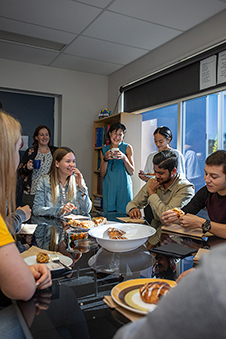EQ support

Our 2019 students at the EQ Programme office
At the start of the year we'll invite you to an information session to meet the team. You'll learn more about the EQ Programme and free services available to make the most of your Health Sciences study.
While most EQ students will be enrolled for Health Sciences First Year ( HSFY ), the EQ Programme also supports those already studying towards a career in health.
Depending on your personal and professional interests, we will guide you with course advice, degree planning and admissions information. All EQ students are also included in free academic and social activities throughout their course of study, as part of a wider EQ whānau in Health Sciences at Otago.
The EQ Programme includes:
- HSFY Peer mentor programme (KAHA)
- Learn to navigate HSFY in a workshop programme led by EQ mentors with experience, expertise and lots of advice!
- Develop study strategies to enhance your learning
- Feel connected and motivated through the demanding HSFY course
- Get tips on the transition to university and maintaining a positive mindset from other EQ students in Health Sciences
- Full group support
- Free weekly EQ supplementary learning sessions (Supps) in ALL HSFY papers
- Extra academic workshops to prepare for tests and exams
- Introduction to a range of Health Science and complementary study areas that can lead to careers in health
- Get to know other EQ students at social events with great kōrero and kai
- Individual support from the EQ (Socioeconomic Equity) Programme team
- Help with study skills and management
- Personalised course advising, degree planning and guidance toward health professional programme application
- Admissions advice about the Socioeconomic Equity sub-category
- We'll look out for your wellbeing and wairua
More about KAHA
KAHA is a peer-led study skills programme specific to HSFY . It's designed and led by EQ students who were HSFY students last year, are now in health professional training, and know their stuff!
At KAHA, you'll learn how to:
- Navigate HSFY effectively
- Manage workload, have balance, and become part of a learning community
- Take notes, summarise, and revise lectures
- Use important apps to make student life easier
- Know what the essential support services on campus are
Jargon
We use a bit of jargon here, so we've provided some definitions to help:
- Decile and the Equity Index
- In 2023, the decile funding system was replaced by the Equity Index (EQI)
The EQI uses detailed data to more accurately estimate the extent a school's students face socioeconomic barriers to achievement. Each school has an individual EQI value on a scale between 344-569 (where the higher value represents greater need). There are 7 bands within the EQI scale; EQ-eligible schools fall within the three highest bands of Above Average/Many/Most. - Domestic student
- Students are classified as domestic if they are New Zealand citizens (including citizens of the Cook Islands, Tokelau, and Niue), or holders of New Zealand residence class visas granted under the Immigration Act 2009 residing and studying in New Zealand, or Australian citizens or permanent residents of Australia resident and studying in New Zealand. All other students are classified as international students.
- Health Sciences First Year ( HSFY )
- HSFY is the first year of most of the University of Otago's health professional programmes. HSFY must be taken in your first year of university study, and is taught on our Dunedin campus. After successfully completing HSFY, you can apply for admission to health professional programmes.
NOTE: HSFY papers are NOT required for application to Dental Technology, Oral Health or Radiation Therapy. - Socioeconomic Equity
- A person's socioeconomic status is typically based on household income, education, and occupation. Equity refers to justice and fairness in society. Socioeconomic Equity is about achieving fairness for people with different socioeconomic backgrounds.